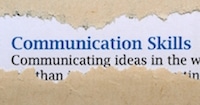10 Reasons for Doctors to Polish their Communications Skills
 Of course, everyone in healthcare has a command of “communications skills.” Doctors, nurses, medical staff, administrators and office employees…everyone “communicates” with patients and co-workers. The trouble is…sometimes ya ain’t so good at it.
Of course, everyone in healthcare has a command of “communications skills.” Doctors, nurses, medical staff, administrators and office employees…everyone “communicates” with patients and co-workers. The trouble is…sometimes ya ain’t so good at it.
Good or bad, interpersonal communications can be verbal or non-verbal, express subtle or obvious ideas, and/or be filled with medical jargon. Although you may think that you’re guilty of none of this, please read on. Maybe you can help “less-perfect” other people.
In patient-provider interaction in particular, research confirms “no matter how knowledgeable a clinician might be, if he or she is not able to open good communication with the patient, he or she may be of no help.” [PMID: 20099777 PubMED]
The breakdown (or failure to communicate) can occur anywhere in the care continuum. Some of the reasons for doctors and other professionals to sharpen their communications skills include:
- Ability to successfully interact with a “difficult” patient
- Adjusting for language barriers such as accents or colloquial expressions
- Clearly presenting diagnosis and/or treatment options
- Delivering a positive patient experience and a higher level of satisfaction
- Enhancing patient’s compliance with medications or treatments
- Exhibiting empathy for patient/patient care
- Gaining a clear understanding of patient needs or medical issues
- Influencing a patient to adopt healthy living or lifestyle changes
- Initiating and growing a trusting relationship
- Understanding, and working with, cultural distinctions or attitudes
Ways to polish your communications skills…
The many years of professional medical education are, by most assessments, considered lacking in the development of good communications skills. Fortunately there are many options for training and real-world applications available for doctors and staff. (Give us a call if you’d like some direction in finding helpful training resources.)
The key components of effective communications often related to applying a systematic cycle of message SENDING, RECEIVING, INTERPRETING and FEEDBACK. These terms may vary a bit in different applications, but generally, the FEEDBACK step—which closes the loop and confirms understanding of the message—is most critical and the step most often neglected.
Psychologist and former theater director Dr. Marjorie Melnick Heymann, takes communications skill development a bit deeper. Her Communication Through Theater approach for doctors stresses:
Being Present – clearing the clutter of mental distractions such as “the previous patient,” schedule or time worries, and other distractions that can reduce focus on the immediate communications task at hand;
Active Listening – applying specific listening-for-understanding techniques that confirm their awareness; and
Active Empathy – processing information for a true awareness of the other person’s needs.
Who’s got time for all that? With training and practice, effective communications skills can become easy to implement and beneficial to use routinely. In addition to better outcomes, communications skills help build rapport and trust, ease tensions and increase patient and professional satisfaction.
Additional reading on this topic is available in our free educational library:
- Critical Skills of Highly Effective Communicators
- Training and Technology: Tools to Close the Physician-Patient Communications Gap
- The Speed of Trust: One Doctor’s System for Physician-Patient Communications
See how Healthcare Success transforms doctor marketing by generating exposure and increasing qualified leads!
Bernadette Wilson
Related Articles:
7 Critical Skills of Highly Effective Communicators
Communication Tools to Enhance Your Relationship with Your Patients
Physicians’ Crying Need for Communications Training in Doctor Marketing
Training and Technology: Tools to Close the Physician-Patient Communications Gap
Improving the Forgotten Half of Doctor-Patient Communications









